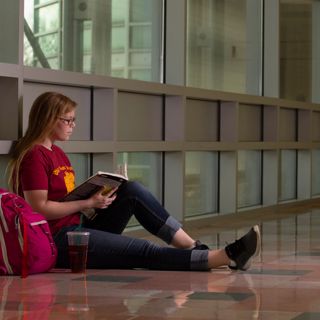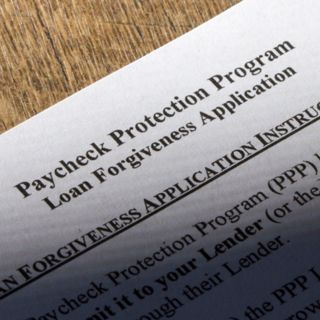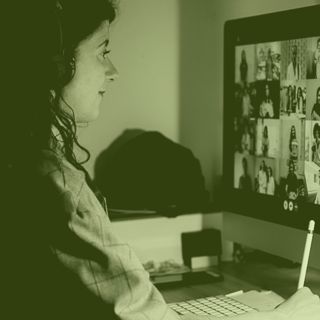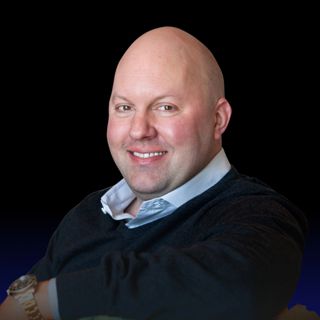
Heroes & Myths in Entrepreneurship -- Guy Raz
"I'm in a movie, but it's the wrong movie."For better or for worse, we tell the story of entrepreneurs as one of the mythical hero's journey: that's there's a call, a test (multiple tests!), a destination... But nothing truly follows such a clean, linear, storytelling arc. Stories of success and resilience are messy and full of "sleepless nights, anxiety-ridden fears, moments of real despair and failure", observes Guy Raz -- who is the host, co-creator, and editorial director of three NPR programs, including the popular podcast "How I Built This" -- and has a new book (coming out this week) on How I Built This: The Unexpected Paths to Success from the World's Most Inspiring Entrepreneurs.But in sharing these stories, are we also indulging in "failure porn"? Where do (and don't) debates about optimism vs. pessimism come in; does this really squelch the appetite for building? What happens when "unexpected paths" are actually things like a once-in-a-lifetime pandemic? Editor in chief (and showrunner of the a16z podcasts) Sonal Chokshi probes Raz on these questions and more, while also pulling the threads of how storytelling IS business -- whether it's a company or a community or a product or a movement. So what's the difference between "building buzz" and "engineering word of mouth"? And how do the stories we tell ourselves, and others, actually move things?Raz is also an entrepreneur with his own production company; has won numerous awards and accolades; co-created a podcast for kids (Wow In The World); and is hosting a music interview show for Spotify, not to mention his NPR shows. So what's his best interview tip? And how does his story also thread into this broader sea of stories, along with the story of the podcasting industry, and even the story (and history) of the Bay Area? This episode is for anyone wanting to figure out how to rewrite their own story... it's really for everyone.
12 Sep 202038min

The Question of Education
Monopoly, oligopoly, cartel. All three of those words can describe the (not so) modern education system today, given the cost structures, economics, and accreditation capture -- in everything from who can and can't start a new university (when was the last time a significant change happened there anyway?!) to where government funding really goes to the student loan and debt crisis.Yet degrees do matter, just not for the reasons we think. So what are the tradeoffs -- when it comes to the "right" school, making money, and assessing skills objectively -- between what's been called "hard" (B.S.) and "soft" (B.A.) degrees? What's the best book on career advice, and what advice does Marc Andreessen -- who went to a public university, worked on a revolutionary project there, and started a company right after -- have for students (and others contemplating change in their careers)... and especially for those considering dropping out, delaying, or skipping college altogether?Andreessen shares his thoughts on the purpose, past and present of education (briefly touching on the impact of the pandemic as well) with Dylan Field, CEO of Figma, which is free for students and educators. The Q&A was recorded in August 2020 and originally appeared as a video in their "Back to School?" interview series; it was actually inspired by the question of taking a gap year and questions about whether or not to go back to school this year that came up in their Virtual Campus community of students from across the world. image: Lyndsy Rommel / Flickr
11 Sep 202058min

Pandemic Relief and Fraud: Willful Deceit or Design Defect?
This episode examines the potential for misuse and fraud among those applying for the Paycheck Protection Program (PPP)—and how fintech and software provide overlooked tools to stop it. On March 27th, the government enacted a $2.2 trillion dollar stimulus package called the CARES Act, the largest aid measure in history. The act provides more than $500 billion for the Paycheck Protection Program, or PPP, a low-interest, forgivable loan program designed to help small businesses and self-employed individuals retain workers and stay afloat during the pandemic. Since March, the Small Business Administration has approved billions of dollars in PPP loans. But it is also estimated that U.S. losses from coronavirus-related fraud and identity theft have reached almost $100 million. According to the New York Times, the Small Business Administration’s fraud hotline has received 42,000 reports about coronavirus-related cheating and misuse; by comparison, last year it had less than 800.To date, the Department of Justice has charged more than 40 cases of PPP-related schemes, from claiming non-existent employees or non-existent businesses to identity theft, kickback schemes, fake tax documents, and multi-state fraud rings. Most of those cases have alleged fraud of more than a $1 million. But what about the countless others that may be cheating taxpayers out of smaller—but not insignificant—sums? How does the government decide who should get money and who shouldn’t among millions of applications from businesses of all industries and sizes—and what role do banks play? How does the program then distribute that money quickly and accurately—or not, in many cases? And what tools are at our disposal to catch those who cheat the system? Host Lauren Murrow is joined by Bharat Ramamurti, the original member of the COVID-19 Congressional Oversight Commission, which is tasked with evaluating the impact of coronavirus relief loans; Naftali Harris, the CEO of SentiLink, a software company that builds technology to detect synthetic fraud; and a16z fintech general partner Alex Rampell.
4 Sep 202040min

Measuring & Managing Community Orgs, Developer Relations and Beyond
Okay, so we know community is important -- whether for developer relations for your product or other types of communities -- but how do we measure the success of community initiatives and even artifacts (like events or schwag), given how indirect and long-cycle so much of it is? How do we know we're even measuring the right things, and is there one key metric or KPI for measuring the health of a community? Where do "meta communities" or where does engaging key community leaders come in?And when it comes to developer relations specifically, where should devrel sit in an organization (product, sales, engineering)? Who should you hire first? How do you reconcile developer as customer vs. developer as community member? And what's the difference between evangelism and advocacy?Amir Shevat -- former VP of Product and Developer Experience at Twitch and former Director of Developer Relations at Slack who also previously worked at Google and Microsoft -- drew on his experiences to share insights and answers to these questions, as well as provides an overview of key concepts, followed by a Q&A with Mikeal Rogers, who works on Community Operations at Protocol Labs, and was formerly Community Manager of the Node.js foundation (and has shared insights on the changing culture and community of open source on a previous episode of the a16z Podcast).This episode is based on a conversation that took place at a portfolio workshop event from a couple years ago organized by former a16z crypto partner Jesse Walden, because crypto gives developers the ability to build on top of and extend any protocol or application in the space, and developer relations and community building is an important part of that being realized. You can find the latest on company building best practices for crypto at a16z Crypto Startup School and see other pieces in our ongoing community series at a16z.com/community.
30 Aug 202033min

Reining in Complexity: Data Science & Future of AI/ML Businesses
There is no spoon. Or rather, “There is no such thing as ‘data’, there’s just frozen models”, argues Peter Wang, the co-founder and CEO of Anaconda — who also created the PyData conferences and grew the early data science community there, while on the frontlines of trying to make Python useful for business analytics. He views both models and data as fluid, more like metaphysics than typical data management… Or perhaps it’s that when it comes to data, those with a physics background just better appreciate the mind-bending complexity and challenges of reining in the natural world, and therefore get the unique challenges of AI/ML development, observes a16z general partner Martin Casado — whose first job after college involved computational physics simulation and high-performance computing in Python at Lawrence Livermore National Laboratory. (Wang, meanwhile, graduated in physics.)But this not just a philosophical question — the answer has real implications for the margins, organizational structures, and building of AI/ML businesses. Especially as we’re in a tricky time of transition, where customers don’t even know what they’re asking for, yet are looking for AI/ML help or know it’s the future. So what does this all mean for the software value chain; for open source collaboration and commodification; and for the future of software businesses? After all, it’s not written in stone that “All information systems must be deconstructed into hardware, and software, and data” and that “software must have these margins”… Will there be a new type of company? image: Pawel Loj / Wikimedia Commons
21 Aug 202044min

Online Learning and the Ed Tech Debate
This episode is all about education and technology, a topic that’s especially top of mind this week as students in much of the country return to school—virtually. The intersection of learning and technology has been accelerated by the pandemic, but the debate around education's "disruption," and what that means for educators doing the hands-on work of teaching, has been swirling for years.In this episode, a16z general partner Connie Chan and host Lauren Murrow are joined by educators and experts Josh Kim, the Director of Online Programs and Strategy at Dartmouth College (whose most recent book, Learning Innovation and the Future of Higher Education, was published earlier this year), and David Deming, Professor of Education and Economics at the Harvard Kennedy School and the Harvard Graduate School of Education.We explore the complicated issue of online education from a variety of angles: Can the quality of online learning stack up to an in-person education? What improvements have we seen over the past decade and what improvements are we likely to see this fall, compared to the COVID scramble last spring? And might this moment be the push we need for educators and technologists—sometimes at odds—to collaborate more closely?We discuss and debate the research behind online learning, the dual impact of tech and COVID on the future of higher ed, and tech's potential in everything from curriculum to access to structural inequality.
17 Aug 202048min

On Vaccines and Vaccinology, in COVID and Beyond
WHEN are we going to have a COVID-19 vaccine, and how the heck are we going from (what’s been traditionally been up to) 12 years or so of vaccine development compressed into 12 months or so? What will and won’t be compromised here, and where do new technologies -- like mRNA or messenger RNA vaccines -- come in? Where will vaccines likely be distributed first, who will and won't get them initially, both across populations... and nations?Rajeev Venkayya, president of the Global Vaccine Business Unit at Takeda Pharmaceutical Company and former White House Special Assistant to the President for Biodefense (where, among other things, he was the principal author of the National Strategy for Pandemic Influenza) joins this special deep-dive episode of the a16z Podcast, in conversation with general partner Jorge Conde to discuss all things vaccines. Including where does manufacturing and scale-up come in -- is "plug and play" really here? -- and by the way, why have we traditionally used eggs in growing vaccines?Where and how can startups and others participate in vaccine development, given how competitive, time-consuming, capital intensive, and risky it is to develop (and sell) them? Can we decouple the question of how we reopen schools with when we have a vaccine? And how do we maintain not just safety and efficacy of vaccines but trust and transparency when it comes to mis/information? We may actually see the emergence of a "Neo Anti-Vaxxer" thanks to the rush... but we may also be entering a renaissance for vaccinology after this pandemic. So what changes, what doesn't? image: Jernej Furman / Flickr
14 Aug 202056min

Turning Open Source Developers Into Superfans
In this episode, we continue our community series with a recent discussion that applies to many kinds of community building. Today’s topic: How do you create a platform that people not only use, but tell their friends about? One that goes beyond just being useful and actually connects deeply with the user? In this discussion, which was recorded at our Crypto Startup School in April 2020, a16z General Partner Chris Dixon talked about building communities — specifically, communities of open-source developers — with GitHub cofounder Tom Preston-Werner. They discussed how to engage early users, how to turn them into your biggest advocates, how to create superfans, and more. Today, GitHub is the leading community for open-source developers and others. They also discuss in-person communities vs. distributed communities, a topic that is very top of mind today.
10 Aug 202045min






















